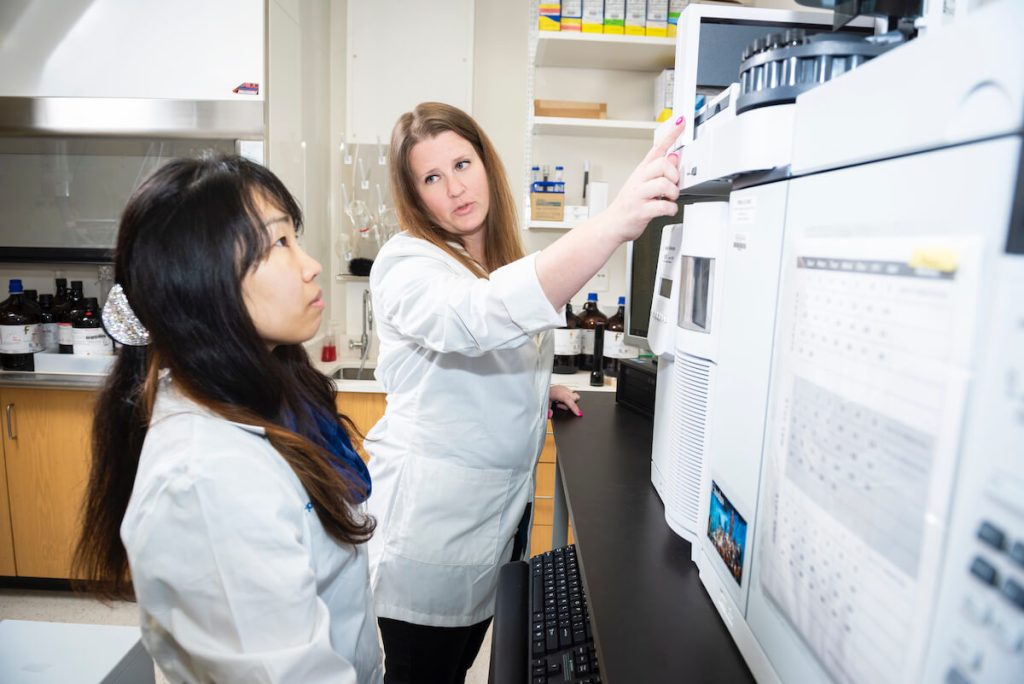CRI’s metabolomics facility provides services through a cost-sharing approach in which users are charged according to number of samples submitted. Our staff consults with potential users to discuss experimental design and costs. Users then submit a sample form to estimate the costs of the experiment. Staff is also available to discuss data interpretation after the experiment. To get started, please email us.

Sample Preparation
For sample preparation protocols, please see the Reference Section.
GC-MS/LC-MS Sample Submission Instructions
New Users
You will need to log in and create an account by filling out the user account creation request. Once your account has been approved, you will log back in to order your samples.
All Users
All users must submit requests through PPMS. Please contact the facility for consultation PRIOR to placing orders.
When your samples have been run and your data analyzed, you will receive an email with your TIC normalized data, statistical analyses, and plots based on the experimental conditions provided in your service form.
Sample Submission
For CRI and UTSW collaborators: Bring your samples on ice or dry ice to NL 11.120.
For external collaborators, please have your samples shipped to:
Children’s Medical Center Research Institute at UT Southwestern Medical Center
Attn: Lauren Zacharias
6000 Harry Hines Blvd
Room NL 11.120G
Dallas, TX 75390-8502
| Pricing Table | Internal | External | Commercial | |
|---|---|---|---|---|
| Isotopic | GC | $17 | $34 | $51 |
| Isotopic | LC | $95 | $190 | $285 |
| Screening | HILIC | $125 | $250 | $375 |
| Screening | Reverse Phase | $125 | $250 | $375 |
| Screening | Lipids | $150 | $300 | n/a |
| Targeted | Pathway/Single Polarity | $65 | $130 | $195 |
| Targeted | Quantification | $65 | $130 | $195 |
| Targeted | Boutique | $100 | $200 | $300 |
| Special Injections | Standard or Calibrator | $12 | $24 | $36 |
| Special Injections | Optimization Fee | $50 | $100 | $200 |
| Flux | Seahorse | $200 | $400 | $600 |
Isotopic Assays
Metabolite tracing through isotopically labeled substrates is an excellent tool for interrogating metabolic pathways and potential interruptions within them. We offer two different platforms for following isotopically labeled metabolites: gas chromatography (GC) and liquid chromatography (LC). For questions about which platform is best for your project, contact us for assistance.
Screening Assays
Samples run on our screening platform will be analyzed against our metabolite databases, and relative abundances — along with relative statistics — will be reported back to you. To acquire this data, we currently utilize three main chromatography platforms: HILIC, Reverse Phase and Lipid. You can find the database of specific metabolites that we monitor with each platform here. As a summary, HILIC favors aqueous metabolites and Reverse Phase favors non-aqueous metabolites. The Lipid platform monitors metabolites, as the name suggests, but requires extra prep. Contact us for more details.
Targeted Assays
An assay is considered “targeted” if a predetermined list of analytes for analysis is used to search against the data. Our suggested workflow usually includes running a screening assay first for hypothesis generation or overall profiling, then — once a specific pathway has been identified as the target pathway for your question of interest — switching your analyses to one of our more specialized/targeted methods. The targeted methods include metabolic pathways, quantifications, specific class analysis and more. Contact us for consultation.
Special Injections
Special injections are additional injections that have the purpose of providing additional information that is not otherwise obtain through the Screening or Targeted assays. This includes, but is not limited to, injections of chemical standards for cataloging or quantitation purposes. Contact us with any questions.
Flux Assays
The seahorse Xfe96 measures oxygen consumption and extracellular acidification in a 96-well format from a variety of sample types, including cultured cells and isolated mitochondria. Contact us with any questions or for assistance.
© 2026 Children’s Research Institute Dallas Texas | Privacy | Site Policies